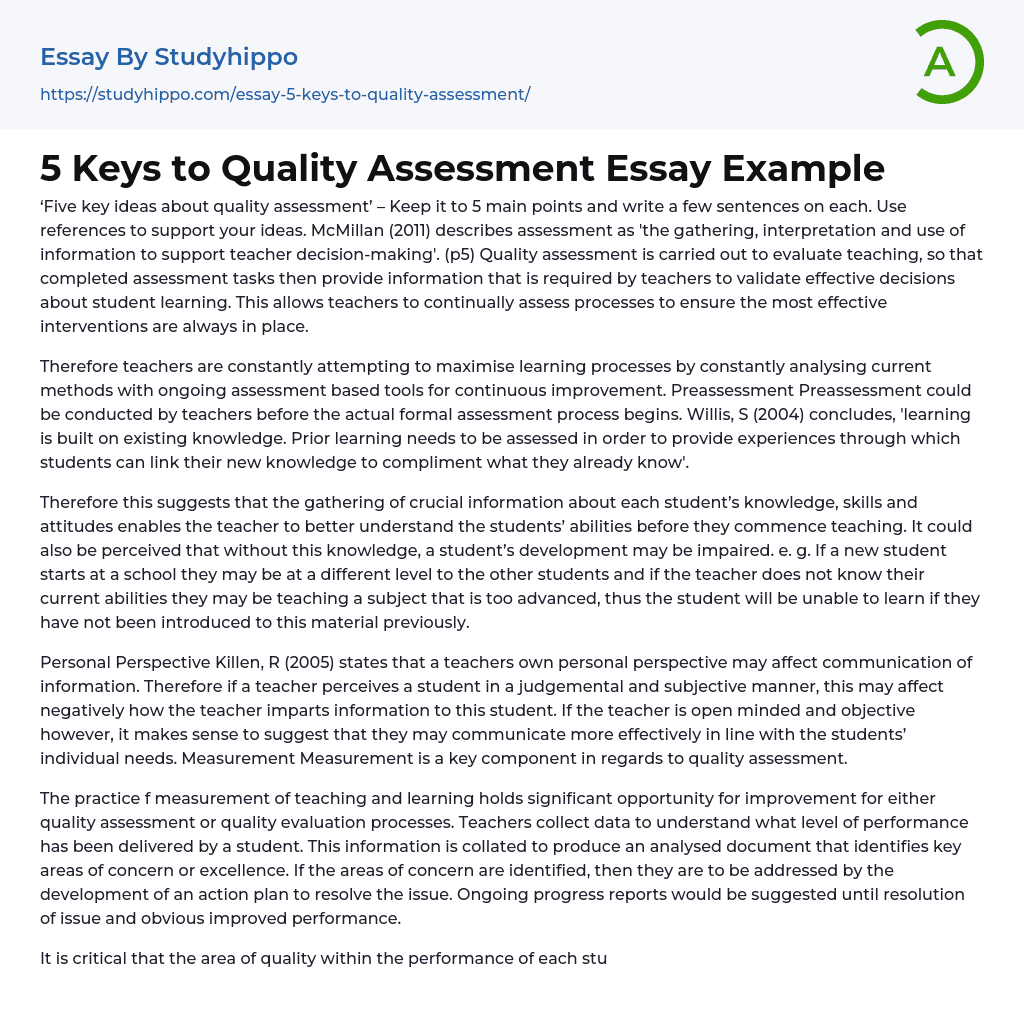‘Five key ideas about quality assessment’ – Keep it to 5 main points and write a few sentences on each. Use references to support your ideas. McMillan (2011) describes assessment as 'the gathering, interpretation and use of information to support teacher decision-making'. (p5) Quality assessment is carried out to evaluate teaching, so that completed assessment tasks then provide information that is required by teachers to validate effective decisions about student learning. This allows teachers to continually assess processes to ensure the most effective interventions are always in place.
Therefore teachers are constantly attempting to maximise learning processes by constantly analysing current methods with ongoing assessment based tools for continuous improvement. Preassessment Preassessment could be conducted by teachers before the actual formal assessment process begins. Willis, S
...(2004) concludes, 'learning is built on existing knowledge. Prior learning needs to be assessed in order to provide experiences through which students can link their new knowledge to compliment what they already know'.
Therefore this suggests that the gathering of crucial information about each student’s knowledge, skills and attitudes enables the teacher to better understand the students’ abilities before they commence teaching. It could also be perceived that without this knowledge, a student’s development may be impaired. e. g. If a new student starts at a school they may be at a different level to the other students and if the teacher does not know their current abilities they may be teaching a subject that is too advanced, thus the student will be unable to learn if they have not been introduced to this material previously.
Personal Perspective Killen, R (2005) states that a
teachers own personal perspective may affect communication of information. Therefore if a teacher perceives a student in a judgemental and subjective manner, this may affect negatively how the teacher imparts information to this student. If the teacher is open minded and objective however, it makes sense to suggest that they may communicate more effectively in line with the students’ individual needs. Measurement Measurement is a key component in regards to quality assessment.
The practice f measurement of teaching and learning holds significant opportunity for improvement for either quality assessment or quality evaluation processes. Teachers collect data to understand what level of performance has been delivered by a student. This information is collated to produce an analysed document that identifies key areas of concern or excellence. If the areas of concern are identified, then they are to be addressed by the development of an action plan to resolve the issue. Ongoing progress reports would be suggested until resolution of issue and obvious improved performance.
It is critical that the area of quality within the performance of each student is clearly stated so that the teacher can identify and measure those areas. Student Involvement 'Student involvement in assessment promotes student engagement and achievement' (McMillan 2011, p24) Therefore it could be suggested that student involvement during their assessment also provides an effective measure of ability. This potentially could empower a student to take a larger responsibility for their own learning, understand how they learn individually and hopefully assist them to achieve valuable communication skills between themselves and their teacher.
Involving students could enable each individual to develop self-assessment skills, so that they can use the
assessments and teacher feedback to further develop their existing knowledge and skills. Multiple Assessment Marge Scherer's article 'The Tests that Won't Go Away' (2009) contends that multiple assessment methods provide a view of whether students achieve the learning outcome identified by a program. These enable educators to provide numerical and descriptive evidence of their students learning abilities as well as their strengths and weaknesses.
Scherer describes the benefits of multiple assessment by stating that 'It is essential that more people understand the aims of these tests, whom they test and how, and their strengths and limitations in providing useful and valid information about students and schools'. Teachers therefore should become assessment literate and understand ways to define multiple measures of approaching assessment and ensure the use of the best assessment resources available.
Teachers can then hopefully utilize the most effective and validated tools to provide hem with the most accurate results, instead of basing a student’s ability on one assessment which could be suggested as rigid and not appropriate in gaining a full view of a student’s abilities. Therefore in conclusion, quality assessment is a crucial area that must at all times be maintained to allow teachers to provide quality methods of teaching, to understand their students’ needs and to provide an individualised learning environment so that all students can achieve maximised results.
- Academia essays
- Higher Education essays
- Language Learning essays
- Studying Business essays
- Education System essays
- Study essays
- First Day of School essays
- Scholarship essays
- Pedagogy essays
- Curriculum essays
- Coursework essays
- Studying Abroad essays
- Philosophy of Education essays
- Purpose of Education essays
- Brainstorming essays
- Educational Goals essays
- Importance Of College Education essays
- Brown V Board of Education essays
- The Importance Of Higher Education essays
- Online Education Vs Traditional Education essays
- Academic And Career Goals essays
- Academic Integrity essays
- Brown Vs Board Of Education essays
- Distance learning essays
- Technology in Education essays
- Vocabulary essays
- Writing Experience essays
- Importance of Education essays
- Early Childhood Education essays
- Academic Degree essays
- Academic Dishonesty essays
- School Uniform essays
- Academic writing essays
- Cheating essays
- Bachelor's Degree essays
- MBA essays
- College Life essays
- Grade essays
- Diploma essays
- Phonology essays
- Sentence essays
- Filipino Language essays
- Pragmatics essays
- Millennium Development Goals essays
- History Of Education essays
- Graduate School essays
- Middle School essays
- School essays
- Special Education essays
- University essays




